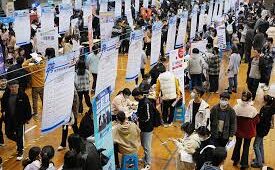China’s job market saw strong growth in Q2 of 2025, with hiring surging in AI, humanoid robotics, and pet services. As AI skills become essential, opportunities are expanding across industries—from advanced manufacturing to pet care—highlighting key shifts in technology and consumer demand driving the country’s employment landscape.
According to data from online recruitment platform 58.com, hiring demand grew by 5.7% quarter-on-quarter in Q2, with a significant increase in resume submissions from job seekers, and recruitment activity was particularly strong in emerging first-tier cities such as Chengdu, Chongqing, and Dongguan. The most in-demand role was waitstaff, followed by sales specialists and general workers/operators.
According to data from another recruitment Zhaopin, in Q2 2025, the pet services industry experienced a 72.2% growth in the number of job postings, ranking first among all service sectors. The 2025 China Pet Industry White Paper, released under the guidance of the China Animal Husbandry Association’s Pet Industry Branch and the Paidu Pet Industry Big Data Platform, indicates that in 2024, the urban pet (dog and cat) consumption market in China surpassed 300 billion yuan, and the rapid development of the “pet economy” has driven demand for service talent in pet healthcare, grooming, and behavior training.
Among these, the demand for pet groomers and veterinarians is the strongest. Zhaopin’s data shows that within the pet services industry, job postings for pet groomers account for 46.1%, a 73.9% increase year-on-year, while veterinary positions account for 17.8%, with a growth rate of 171.1%.
Other industries in the top five for growth include the automotive aftermarket, elderly care/nursing, gaming, and online life services, with job posting increases of 52.4%, 42.1%, 34.7%, and 33.4% respectively. In the automotive aftermarket, car maintenance jobs account for the highest proportion of postings at 15.5%, while the fastest growth is seen in automotive after-sales services, up 83.9% year-on-year, followed by auto detailing at 77.5%.
In the elderly care/nursing sector, both educational and experience requirements increased in Q2 2025 compared to the same period in 2024. The proportion of job postings requiring a bachelor’s degree or higher rose from 15.3% to 24.7%, while those requiring an associate degree fell from 47.9% to 41.0%. In terms of experience, the share of postings requiring 3-5 years or more than 5 years of experience has expanded. The average monthly recruitment salary in Q2 2025 for this industry was 8,187 yuan, a 10% increase from 7,440 yuan in Q2 2024.
In advanced manufacturing, Zhaopin data shows that job postings in the humanoid robotics sector soared by 398.1% year-on-year in Q2. Military manufacturing followed, with a 76.7% increase in postings. According to the central fiscal budget draft report, China’s national defense budget for 2025 is set at 1.81 trillion yuan, a 7.2% increase from the previous year, with the push for smart and informationized weaponry directly driving demand for talent in military manufacturing.
Next in line is the new materials industry, which saw a 72.1% growth rate. According to data from the National Bureau of Statistics (NBS), industrial production data for May shows that the output of high-performance chemical fibers and bio-based chemical fibers increased by 92.2% and 21.5% respectively. Demand for smart hardware talent also rose by 50.3%.
Data from recruitment platform Liepin shows that in the first half of 2025, AI-related positions accounted for six of the top 20 fastest-growing job categories, each with growth exceeding 30%. Notably, robotics engineers and algorithm engineers topped the list with over 50% growth, while roles in data modeling, deep learning, data labeling, and machine learning also exhibited significant growth.
In the first half of 2025, newly created positions involving AI technologies grew by 36.82%, with the roles spanning across various industries, with the internet, electronics/semiconductors/integrated circuits, and computer software ranking in the top three by share. Among the top ten industries by proportion of new AI tech positions, the home appliance sector saw the fastest growth at 277.43%, reflecting the accelerated adoption of smart home products.
Regarding the geographic distribution of AI tech talent demand, the Yangtze River Delta leads nationally with a 40.30% share, followed by the Guangdong-Hong Kong-Macau Greater Bay Area and the Beijing-Tianjin-Hebei region, each with about a 20% market share. In terms of growth rate, the Greater Bay Area leads with a 45.12% year-on-year increase, followed by the Yangtze River Delta and Chengdu-Chongqing region, both exceeding 35%. In city rankings for AI tech roles, Shenzhen, Beijing, and Shanghai hold the top three spots, together accounting for 50.94%.
In terms of compensation, 31.03% of AI tech roles offer annual salaries above 500,000 yuan, significantly higher than the all-industry average (6.40%), the internet sector (18.64%), and the overall AI industry (15.31%). The highest-paying positions are concentrated in deep learning, followed by machine learning.
Liepin’s Talent Shortage Index for the first half of 2025 shows a particularly acute talent supply-demand imbalance in high-tech fields. Search algorithm engineers and livestream hosts rank first and second, both scoring over 6 (TSI > 1 indicates demand exceeds supply).
According to the Liepin’s data, livestream selling has become a standard marketing channel across industries, making professionally skilled and influential hosts highly sought after, and meanwhile, in an era of information overload, precision recommendation algorithms directly determine content delivery efficiency, turning search algorithm talent into a fiercely contested resource among enterprises.
In additiion, companies’ emphasis on AI application capabilities has expanded from technical roles to a broader range of functional positions. In the first half of 2025, job postings explicitly requiring AI tool proficiency surged by 149.41% year-on-year. Regarding salaries, positions requiring AI skills offered an average annual salary of 294,500 yuan in the first half of 2025, up from 278,400 yuan in the same period of 2024, maintaining a lead of about 78,000 yuan over roles without AI skill requirements.

